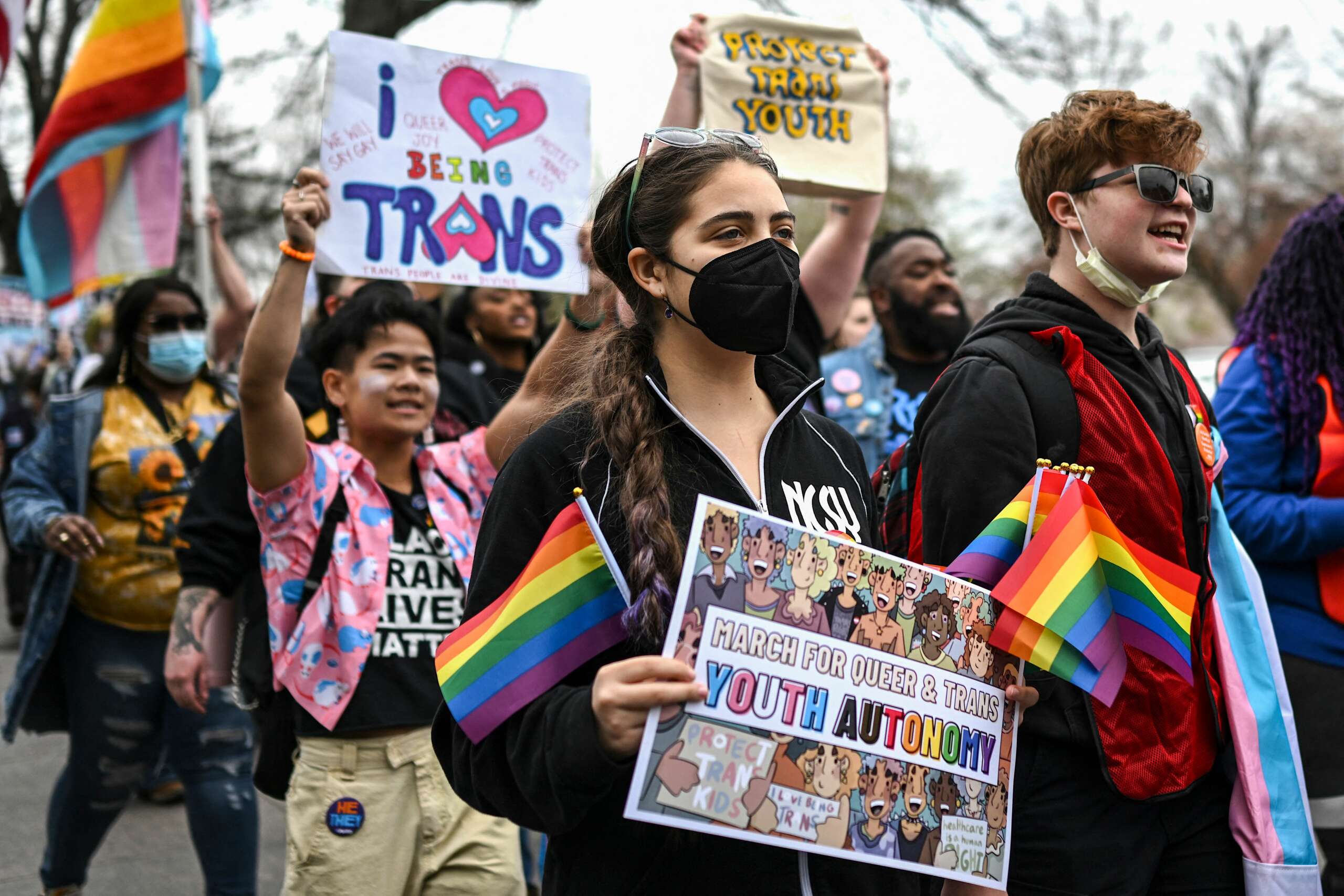Research reveals The New York Times excluded transgender voices in 66 percent of its trans issue coverage.
By Zane McNeill ,
TRUTHOUT
March 27, 2024

The New York Times building stands in Midtown on February 7, 2024, in New York City.
SPENCER PLATT / GETTY IMAGES
Arecent study conducted by Media Matters and GLAAD reveals that in the year following public backlash for its coverage of anti-trans legislation, The New York Times neglected to include transgender voices in approximately two-thirds of its stories on the subject.
“The paper of record has an obligation to present its readers with the full human toll of the anti-trans legislative assault,” Ari Drennen, LGBTQ Program Director at Media Matters, said in a statement. “Trans people are more than theoretical curiosities to be debated from afar. Each and every anti-trans bill affects living, breathing people whose voices deserve to be heard and whose stories deserve to be told.”
Between February 15, 2023, and February 15, 2024, the Times published 65 articles addressing U.S. anti-trans legislation in either their headlines or opening paragraphs. Media Matters and GLAAD’s research found that 66 percent of the articles did not include a single quote from a trans or gender-nonconforming person, 18 percent of the articles quoted misinformation from anti-trans activists without sufficient factchecking or contextual elaboration, and six articles obscured the anti-trans backgrounds of sources, neglecting to mention their histories of extremist rhetoric or actions.
“As a well respected news organization, The New York Times should be ashamed of their lack of fact checking and representation of trans voices in their articles. The New York Times’ biased articles have contributed to the deadly culture war against the transgender community,” LGBTQ legislative researcher Allison Chapman told Truthout.
RELATED STORY
Arecent study conducted by Media Matters and GLAAD reveals that in the year following public backlash for its coverage of anti-trans legislation, The New York Times neglected to include transgender voices in approximately two-thirds of its stories on the subject.
“The paper of record has an obligation to present its readers with the full human toll of the anti-trans legislative assault,” Ari Drennen, LGBTQ Program Director at Media Matters, said in a statement. “Trans people are more than theoretical curiosities to be debated from afar. Each and every anti-trans bill affects living, breathing people whose voices deserve to be heard and whose stories deserve to be told.”
Between February 15, 2023, and February 15, 2024, the Times published 65 articles addressing U.S. anti-trans legislation in either their headlines or opening paragraphs. Media Matters and GLAAD’s research found that 66 percent of the articles did not include a single quote from a trans or gender-nonconforming person, 18 percent of the articles quoted misinformation from anti-trans activists without sufficient factchecking or contextual elaboration, and six articles obscured the anti-trans backgrounds of sources, neglecting to mention their histories of extremist rhetoric or actions.
“As a well respected news organization, The New York Times should be ashamed of their lack of fact checking and representation of trans voices in their articles. The New York Times’ biased articles have contributed to the deadly culture war against the transgender community,” LGBTQ legislative researcher Allison Chapman told Truthout.
RELATED STORY

States’ Anti-LGBTQ Moves May Have Disastrous Health Impacts, Experts Say
Medical professionals are worried about the long-term physical and mental effects of anti-LGBTQ legislation.
By Orion Rummler , THE19TH
March 23, 2024
The Times has been increasingly critiqued for its problematic coverage of transgender people and challenges, such as gender-affirming care bans, facing the transgender community over the past year.
“Prominent frontpage coverage has frequently missed the big picture of the trans community, choosing instead to hyper-scrutinize essential and mainstream medical care, undermining its support among readers who know next to nothing about this care, while laundering extremist talking points as legitimate concern,” Serena Sonoma wrote for GLAAD in April 2023. “The Times’ coverage has elevated critics without alerting readers to their anti-LGBTQ, anti-trans histories and their coordination and connections to longtime anti-LGBTQ groups like Alliance Defending Freedom.”
Last February, over 150 LGBTQ organizations and leaders, including GLAAD, published an open letter condemning the Times‘ harmful and inaccurate coverage of transgender people. The letter demanded that the Times stop publishing anti-trans articles, meet with leaders from the transgender community, and hire transgender writers and editors. According to GLAAD, the Times has not met any of the letter’s demands.
“One of the first recommendations we make during the hundreds of LGBTQ education briefings we hold with national and local newsrooms is to include LGBTQ voices in LGBTQ stories: interview the people impacted by your coverage and include their perspectives. The New York Times failed that basic reporting lesson 101, and replaced it with a pattern of obfuscating sources’ anti-trans affiliations and allowing their misinformation to go unchecked,” Sarah Kate Ellis, President and CEO of GLAAD, said in a statement. “Our coalition of more than 150 organizations, community leaders, and notable LGBTQ people and allies remains steadfast in our calls for the Times to improve their coverage of transgender people.”
In April of last year, hundreds of contributors to the Times also wrote a letter critiquing its handling of transgender topics. Times management responded by saying in a memo that: “Participation in such a campaign is against the letter and spirit of our ethics policy. That policy prohibits our journalists from aligning themselves with advocacy groups and joining protest actions on matters of public policy. We also have a clear policy prohibiting Times journalists from attacking one another’s journalism publicly or signaling their support for such attacks.”
The Times’ anti-trans coverage has been weaponized by anti-LGBTQ groups in legal filings to undermine transgender youth’s access to lifesaving health care. In fact, an anti-transgender op-ed published by the Times in February by Pamela Paul titled “As Kids, They Thought They Were Trans. They No Longer Do.” which was thoroughly debunked by transgender activist and journalist Erin Reed as relying on “pseudoscience,” was cited in a legal brief in Idaho within just four days of its publication.
“I felt compelled to highlight how central these pieces are to the legal structures limiting our material survival. Within 4 days of publication Paul’s piece was cited by Idaho officials in federal court — represented by Alliance Defending Freedom — in the state’s defense of their anti-trans law banning this medical treatment for minors,” Chase Strangio, the deputy director for transgender justice with the ACLU’s LGBT & HIV Project, said on Instagram earlier this year. “The distortions and the false debate are causing immediate and severe material harms that will be felt for generations.”
This article is licensed under Creative Commons (CC BY-NC-ND 4.0), and you are free to share and republish under the terms of the license.
ZANE MCNEILL is a trending news writer at Truthout. They have a Master’s Degree in Political Science from Central European University and is currently enrolled in law school at the University of Denver Sturm College of Law. They can be found on Twitter: @zane_crittheory.
The Times has been increasingly critiqued for its problematic coverage of transgender people and challenges, such as gender-affirming care bans, facing the transgender community over the past year.
“Prominent frontpage coverage has frequently missed the big picture of the trans community, choosing instead to hyper-scrutinize essential and mainstream medical care, undermining its support among readers who know next to nothing about this care, while laundering extremist talking points as legitimate concern,” Serena Sonoma wrote for GLAAD in April 2023. “The Times’ coverage has elevated critics without alerting readers to their anti-LGBTQ, anti-trans histories and their coordination and connections to longtime anti-LGBTQ groups like Alliance Defending Freedom.”
Last February, over 150 LGBTQ organizations and leaders, including GLAAD, published an open letter condemning the Times‘ harmful and inaccurate coverage of transgender people. The letter demanded that the Times stop publishing anti-trans articles, meet with leaders from the transgender community, and hire transgender writers and editors. According to GLAAD, the Times has not met any of the letter’s demands.
“One of the first recommendations we make during the hundreds of LGBTQ education briefings we hold with national and local newsrooms is to include LGBTQ voices in LGBTQ stories: interview the people impacted by your coverage and include their perspectives. The New York Times failed that basic reporting lesson 101, and replaced it with a pattern of obfuscating sources’ anti-trans affiliations and allowing their misinformation to go unchecked,” Sarah Kate Ellis, President and CEO of GLAAD, said in a statement. “Our coalition of more than 150 organizations, community leaders, and notable LGBTQ people and allies remains steadfast in our calls for the Times to improve their coverage of transgender people.”
In April of last year, hundreds of contributors to the Times also wrote a letter critiquing its handling of transgender topics. Times management responded by saying in a memo that: “Participation in such a campaign is against the letter and spirit of our ethics policy. That policy prohibits our journalists from aligning themselves with advocacy groups and joining protest actions on matters of public policy. We also have a clear policy prohibiting Times journalists from attacking one another’s journalism publicly or signaling their support for such attacks.”
The Times’ anti-trans coverage has been weaponized by anti-LGBTQ groups in legal filings to undermine transgender youth’s access to lifesaving health care. In fact, an anti-transgender op-ed published by the Times in February by Pamela Paul titled “As Kids, They Thought They Were Trans. They No Longer Do.” which was thoroughly debunked by transgender activist and journalist Erin Reed as relying on “pseudoscience,” was cited in a legal brief in Idaho within just four days of its publication.
“I felt compelled to highlight how central these pieces are to the legal structures limiting our material survival. Within 4 days of publication Paul’s piece was cited by Idaho officials in federal court — represented by Alliance Defending Freedom — in the state’s defense of their anti-trans law banning this medical treatment for minors,” Chase Strangio, the deputy director for transgender justice with the ACLU’s LGBT & HIV Project, said on Instagram earlier this year. “The distortions and the false debate are causing immediate and severe material harms that will be felt for generations.”
This article is licensed under Creative Commons (CC BY-NC-ND 4.0), and you are free to share and republish under the terms of the license.
ZANE MCNEILL is a trending news writer at Truthout. They have a Master’s Degree in Political Science from Central European University and is currently enrolled in law school at the University of Denver Sturm College of Law. They can be found on Twitter: @zane_crittheory.


No comments:
Post a Comment